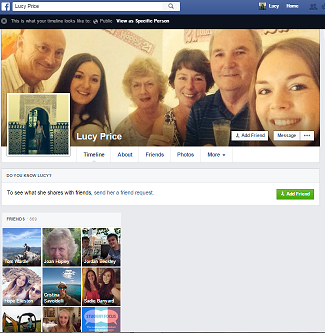
During topic three’s discussion of developing an authentic online profile, I touched on the fact that 93% of recruiters are using or planning on using social media in their recruitment efforts (Jobvite, 2014). Is this ethical? Do our potential employers have the right to spy on us?
“Yes, why not?”

As Lauren Riley (2014) points out, ‘unless a company has a policy on social media screening, then recruiters aren’t technically doing anything wrong’. Social media is not only a great way to research potential employees but also to discover any warning bells such as incriminating information before employing them.
“No, how dare they!”
Joyce Lemay (2014) compares social media snooping to following a job applicant home and peeking into their front window. Pictures on social media can be misinterpreted as they do not tell the entire story which can lead employers to making erroneous decisions and losing out on talented and suitable employees.
So is this an invasion of our privacy?
Glenn Greenwald (2014) highlights that we as human beings understand the importance of privacy as it entitles us to existence without judgemental eyes of others. I argue that putting something on the Internet stops it from being in one’s realm of privacy because other people, even if it just our friends, can see this information.

What we must realise is that the power is in our hands. The greatest gift that social media gives us is the ability to control our privacy settings. So while we can allow our potential employer to have a good look at our identity on LinkedIn, we can restrict their access to our other, perhaps more personal, online identities such as Facebook and Instagram. Nick Miklusak (2009) discusses here how we can take advantage of positioning ourselves in the best light on social media.
To answer my own question, no I don’t think employers are invading our privacy by looking at our social media because they can only look at what we allow them to look at.
In this video, Ricky Martin (2015) explains how he became excited over a potential employee with an outstanding CV so he proceeded to look at their social media, only to find X-rated wording and unsavoury photos, so he decided not to employ them. A miscalculated judgement or saved by the warning bell? I argue the latter because although these posts and photos could be an inaccurate depiction of the potential employee now, he/she still allowed for the employer to see this inappropriate material.

The bottom line is that social media screening is invaluable to employers. But we are in control of what they can see, so why not use this to our advantage and create the best image possible?
Word Count: 434
References
Greenwald, G (2014) ‘Why Privacy Matters’ TED. Accessed 20/11/14 from http://www.ted.com/talks/glenn_greenwald_why_privacy_matters#t-300330
Jobvite (2014) Social Recruiting Survey. Accessed 06/11/15 from https://www.jobvite.com/wp-content/uploads/2014/10/Jobvite_SocialRecruiting_Survey2014.pdf
Lemay, J (2014) ‘Should Employers Use Social Media to Screen Job Applicants?’ SHRM. Accessed 20/11/15 from http://www.shrm.org/publications/hrmagazine/editorialcontent/2014/1114/pages/1114-social-media-screening.aspx
Martin, R. (2015) ‘Do employers check social media networks before hiring?’ Hyper Recruitment Solutions. Accessed 20/11/15 from https://www.youtube.com/watch?v=fA6_C_2rhQo
Miklusak, N (2009) Neil Miklusak CTV Interview: Social Media as a Candidate Screening Tool. Accessed 20/11/15 from https://www.youtube.com/watch?v=fA6_C_2rhQo
Riley, L (2014) ‘Social media screening- is it ethical?’ HRZone. Accessed 20/11/14 from https://www.hrzone.com/talent/acquisition/social-media-screening-is-it-ethical
Hi Lucy,
I thoroughly enjoyed reading your post this week. I liked that you provided both sides to the argument, giving people the option to argue for and against the argument. I must say that I agree with you that it’s up to the individual in question to make sure their privacy settings are restricted so that an employer doesn’t see personal posts. But as your Ricky Martin example demonstrates, being able to see someone’s posts can save a company a lot of time and hassle.
Recruiters aside, I’d like to ask what your feelings are on the police using social media to find criminals. Do you think the police have the right to go above the privacy settings set out by platforms like Facebook and Twitter to track down criminal activity. With the war on terror seemingly getting worse, should the police be allowed to gain access to a private account that they believe may be inciting hate over the internet?
Would be great to hear your thoughts.
Sophie
LikeLiked by 1 person
Hi Sophie,
Thank you for your comment!
Due to the broad reach of social media platforms such as Facebook and Twitter, terrorist groups are using social media to spread their message. I believe that the police should have the right to go above and beyond the privacy settings in order to ensure the public’s safety.
On the other hand, I understand that if the government have more control of the privacy settings than the user, we’re entering into a “Big Brother” kind of world where anything we do or say is monitored.
Like all of the ethics our fellow bloggers have explored, this is a debate which has two sides to it. What do you think?
Lucy
LikeLike
Hi Lucy,
I completely agree with your points. It’s really difficult to take sides as both have pros and cons but I guess I would say that if the police have an indication that there is potential terror being spread via someone’s private account, they have every right to go above the settings to see what message is being spread. That’s not to say they can do this with everyone and I think this is where we draw the line to stop the government gaining more control over its citizens. The police should only be able to over the privacy settings if they have reason to believe someone is encouraging hate over social media.
Sophie
LikeLiked by 1 person
I think the issue may well have moved on – any terrorist with any sense (and they are certainly computer literate now) won’t be using social media for anything other than making contacts and recruiting fighters. The serious stuff will be done in the so-called ‘dark net’ where end-to-end encryption makes it impossible for MI5 or whomever to read any communications. Asking for data to be stored by internet providers, and rights of access to our digital communications is just using terrorism as an excuse. If they want my data, fine, but they can apply for a court order in the usual way so that there’s at least some chance that their demands will be scrutinised by a third party.
LikeLike
Hey Lucy,
Employers need a way to sift through the hundreds of applications they get and so one way that makes their lives much easier is through checking candidates’ online profile to see if there is anything incriminating. If a candidate has gone to the effort of sorting out their online profiles so that they look professional, then this shows that they have made an active effort to look professional.
Click to access The-use-of-social-media-in-the-recruitment-process.pdf
I do not agree with looking at people’s facebook because this is a tool that most people use to keep in contact with their friends and so it seems cruel to judge how good they will be at a job just based on how they act with their friends. There are many ways that you can keep your facebook profile hidden. http://www.digitalspy.com/tech/feature/a552990/how-do-i-make-my-facebook-profile-private/
LikeLike
Hi Lewis,
Thank you for your comment!
I completely agree with you in the sense that an employer can see if a candidate is professional if they are mindful enough to maintain a professional online profile.
I believe that Facebook is a personal network and allows us to keep in touch with friends and family so we might not want our potential employer to be snooping around on our profile. As you say, we can actively keep this hidden. Thank you for your links. I like the fact that the second link mentions that “ultimate privacy” is achievable by simply deactivating our account. It’s not something I’ll be doing as I’m comfortable with having tight privacy settings which allow just my Facebook friends to see my posts.
Lucy
LikeLike
Hi Lucy,
Much as I do agree with Glenn Greenwald that privacy is a basic human need that should be maintained, I think you’re right in saying that we do have the power to control what it is that potential employers can see when they check out our social media pages, and therefore if we fail to make our profiles private we only have ourselves to blame if something they see makes them decide they don’t want to hire us.
In this day and age when the majority of jobs do require a certain level of knowledge about the digital world perhaps we can’t blame employers for thinking that someone that leaves their profile open for all to see and posts questionable contact is lacking in common sense!
I have a friend who instead of cleaning up the slightly dodgy content on his facebook (he used to go out a lot!) simply changed his surname from ‘Jones’ to ‘James’. He now has a job as an investment banker so I guess it worked for him!
Katie
LikeLike
Hey Katie,
I think you hit the nail on the head when you said that we only have ourselves to blame if we aren’t hired after putting something dodgy on social media which we fail to hide with our privacy settings. At the end of the day, we are responsible for anything we put on social media.
Great story about your friend! But couldn’t he have just changed his privacy settings so his boss didn’t find any of the dodgy content on his Facebook?
Thank you for commenting!
Lucy
LikeLike
Hi Lucy,
I completely agree with your opinion that employer’s using social media as investigative means is not an invasion of privacy. When you upload something online you willingly do so knowing that it has the potential to be leaked, and as such must be wary with what you upload; remember “the internet never forgets, so be careful what put on it” (http://www.independent.co.uk/student/istudents/the-internet-never-forgets-so-be-careful-what-you-put-on-it-8787706.html).
Even if you maintain strict privacy control so that only those you trust and accept are able to view your material; what is there to stop a ‘trusted’ yet competitive colleague ratting you out to your boss if you upload material that could potentially jeopardize the company.
Also, you are an ambassador of the company you work for; if your employer can see your profile then so can its customers, competitors and associates. I believe your employer has a right to ensure you don’t portray a bad image for the company.
LikeLike
It’s a big leap from ‘I’m posting a comment on my social network page’ to ‘I’m posting a comment on my social network page which, by implication, means that I am completely relinquishing all my rights to privacy – go ahead people of the internet, feel free to do what you like with my life!’. That’s like saying ‘I’m putting this picture of my town on my blog, and if any newspapers would like to take it and use it instead of having to pay a photographer that’s fine because, hey, I put it here so that means I’m giving up all rights!’ Making assumptions is extremely dangerous and can lead to situations we haven’t agreed to, don’t you think?
LikeLike